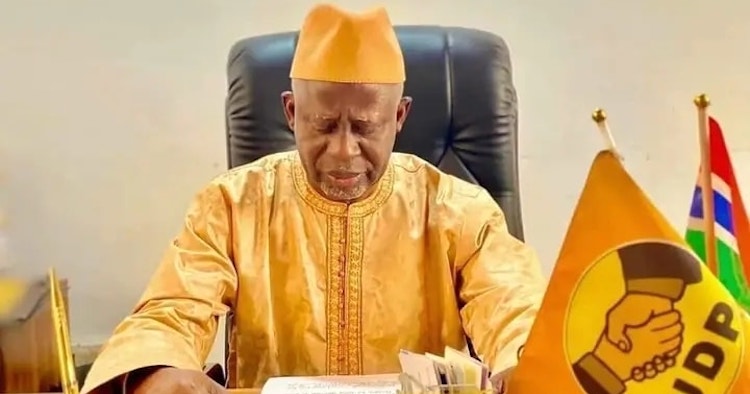Gambiaj.com – (BANJUL, The Gambia) – In the wake of the dramatic rejection of the 2024 draft constitution by the National Assembly, Ousainou Darboe, leader of the United Democratic Party (UDP), has outlined his party’s next steps, signaling a renewed push for genuine constitutional reform rooted in popular consultation.
Speaking at a press conference on Tuesday, Darboe described the failure of the 2024 draft as not merely a legislative setback for President Adama Barrow’s administration but “a national indictment” of a government he accused of repeatedly betraying the Gambian people’s aspirations for democratic change.
“This moment is not just about the failure of the bill,” Darboe said, “it is about something far deeper—a problem of failed leadership and political betrayal.”
Darboe accused President Barrow and his allies of sabotaging the 2020 draft constitution, a version he described as “the most inclusive and people-centered draft” in the country’s history.
He reminded Gambians that the 2020 draft had been developed through wide-ranging consultations involving citizens, civil society, and experts, only to be defeated by the same government now pushing the rejected 2024 draft.
He dismissed the 2024 document as a “closed-door” draft, crafted to serve political interests rather than the national good. “We did not reject reform; we rejected a process that excluded the people,” Darboe stated.
Darboe’s Plan: Reviving the People’s Draft and Launching a National Dialogue
In his remarks, Darboe laid out a clear roadmap for his party’s next steps, stressing that the fight for constitutional reform is far from over. He said the UDP and its allies remain committed to reviving the 2020 draft constitution, which he believes still commands popular support.
He called for the initiation of a “general national dialogue” and a “transitional justice” process to restart constitutional reforms. Darboe also signaled a willingness to work with all democratic forces and engage with the National Assembly to ensure that any future draft reflects the collective will of the Gambian people.
“If necessary, updates may be needed at the National Assembly level—but always grounded in freedom and democracy,” he said.
Darboe warned that the current administration’s repeated failures to deliver credible reforms demonstrated its priority was political survival, not nation-building. He urged citizens to remain vigilant against any attempts to impose a “self-serving” constitution.
“The Gambia is our country,” he declared. “We must now return to rebuild our democracy, rooted in the sovereign will of the people.”
He further ruled out supporting any constitutional process that bypasses the voices of Gambians, stating emphatically that a national charter “cannot be drafted in secret rooms and rushed through parliament to satisfy a few.”
UDP Eyes on Reform Agenda, Pressure, and Civic Mobilization
The UDP leader stressed that his party would not be deterred by the defeat of the bill or future political hurdles.
“This is not an end,” Darboe concluded. “It is a new beginning. Let us reclaim the reform agenda. Let us defend our democracy. Let us work together to build a constitution that reflects our shared goals, values, and the future of our children.”
Analysts say Darboe’s statement signals an escalation of political pressure on the Barrow administration. Beyond parliamentary maneuvers, the UDP appears poised to mobilize civil society, political allies, and grassroots groups for a sustained campaign to revive the 2020 draft.
His call for a national dialogue also raises questions about whether the UDP could spearhead a broader opposition coalition, positioning itself as the guardian of popular sovereignty in the lead-up to the next election cycle.
Darboe’s words suggest that the constitutional debate will remain a major battleground in Gambian politics, with the UDP framing itself as the party of “unfinished democratic business.”
Whether the government will respond to these calls remains uncertain, but what is clear is that The Gambia’s constitutional reform process is entering a new, potentially more contentious, phase.










